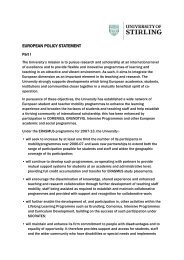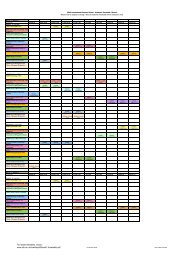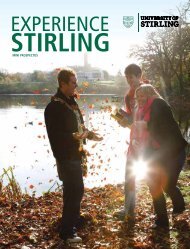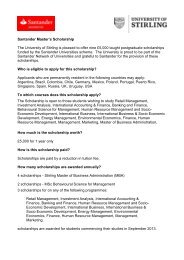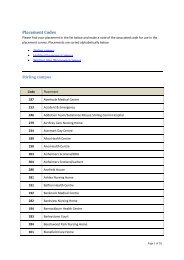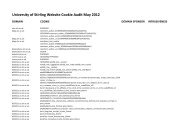Supporting a uK SucceSS Story: The impacT of - Research Councils ...
Supporting a uK SucceSS Story: The impacT of - Research Councils ...
Supporting a uK SucceSS Story: The impacT of - Research Councils ...
You also want an ePaper? Increase the reach of your titles
YUMPU automatically turns print PDFs into web optimized ePapers that Google loves.
“This interactive<br />
approach will<br />
allow a broadcast<br />
operator to<br />
reconstruct<br />
the 3D skeletal<br />
motion <strong>of</strong> an<br />
athlete allowing<br />
subsequent use<br />
for analysis and<br />
commentary.”<br />
frames. This interactive approach will allow a broadcast operator<br />
to reconstruct the 3D skeletal motion <strong>of</strong> an athlete allowing<br />
subsequent use for analysis and commentary. For example, the<br />
recovered skeletal motion might be used to compare different<br />
high-jump attempts for an individual athlete or to allow comparison<br />
between athletes in a track event such as the 100 metres.<br />
<strong>The</strong> Centre for Vision, Speech and Signal Processing (CVSSP)<br />
at the University <strong>of</strong> Surrey has had a close collaboration with<br />
BBC <strong>Research</strong> and Development for over a decade working on a<br />
number <strong>of</strong> joint industry-academic research projects supported by<br />
the UK Technology Strategy Board and EU. <strong>The</strong>se projects have<br />
focused on the use <strong>of</strong> computer vision in broadcast production<br />
and specifically on the analysis <strong>of</strong> video captured from multiple<br />
views to capture 3D reconstructions <strong>of</strong> actor performance or live<br />
events. In addition to collaborative projects BBC <strong>Research</strong> also<br />
directly sponsor a number <strong>of</strong> PhD students in CVSSP. This allows<br />
investigation <strong>of</strong> long-term research problems which are <strong>of</strong> direct<br />
interest and relevance to the BBC, this currently includes PhD’s in<br />
3D video production, sports player motion analysis and advanced<br />
tools for video editing.<br />
Keeping your cool<br />
“<strong>The</strong> group’s<br />
research was<br />
particularly<br />
effective at the<br />
2004 Olympics<br />
in Athens and<br />
2008 in Beijing.<br />
In 2004 Great<br />
Britain’s cyclists<br />
used cooling chairs<br />
where the athletes<br />
sat with their<br />
hands immersed<br />
in plastic bags full<br />
<strong>of</strong> ice attached<br />
to picnic chair<br />
armrests.”<br />
<strong>The</strong> Extreme Environments Laboratory in the Department <strong>of</strong><br />
Sport and Exercise Science at the University <strong>of</strong> Portsmouth<br />
has a well-established international reputation in the area <strong>of</strong><br />
thermal physiology, the effect <strong>of</strong> temperature on the human<br />
body. <strong>Research</strong>ers examine the physiological and psychological<br />
responses to adverse environments and work with a range <strong>of</strong> elite<br />
sporting groups as well as the military, oil industry, fire-fighters,<br />
RNLI and HM Coastguard. <strong>The</strong> laboratories at Portsmouth are also<br />
the recognised thermal physiology labs for UK Sport.<br />
Pr<strong>of</strong>essor <strong>of</strong> Human and Applied Physiology, Mike Tipton, explains:<br />
“It’s a well-established fact that performance degrades as you<br />
become too hot and there are so many sports where the heat<br />
can affect anything from concentration to physical performance.<br />
Shooting or fencing, for example, both require quick decisionmaking<br />
and heat can have a pr<strong>of</strong>ound effect on this.” <strong>The</strong> group’s<br />
research was particularly effective at the 2004 Olympics in<br />
Athens and 2008 in Beijing. In 2004 Great Britain’s cyclists used<br />
cooling chairs where the athletes sat with their hands immersed<br />
in plastic bags full <strong>of</strong> ice attached to picnic chair armrests, to cool<br />
down their core temperature. It might have looked strange, but<br />
the Great Britain cycling team came away with four medals in<br />
2004 – two gold, one silver and one bronze.<br />
SECTION ONE : TECHNOLOGY 19





